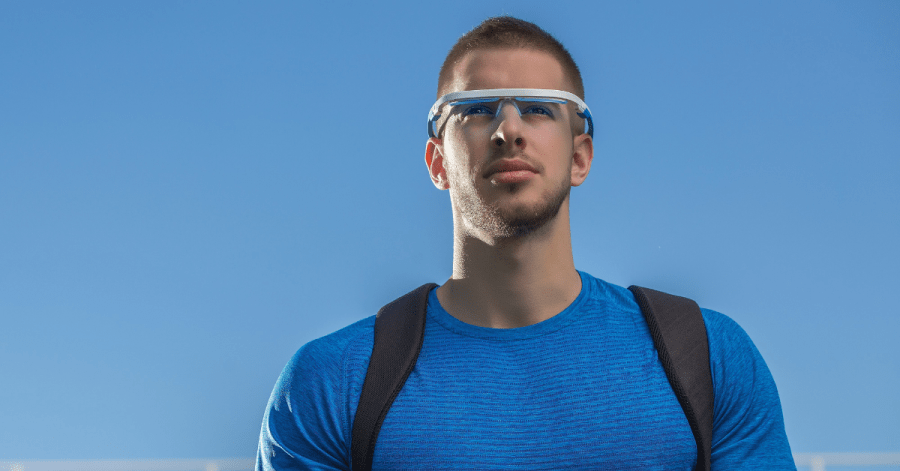We all have our own “instantly awake” body hack solutions, regardless of whether we need to feel fresh and energized for work, a night out, or a professional sports competition. Yes, we are talking about these two shots of espresso, caffeine pills, and energy drinks. Even though they surely do the job, the long-term effect of their consumption is by no means good for our bodies and internal clocks. So is there another way?
Thanks to technology and science there is. And, in fact, the global sleeptech devices market reached some $12.5B in 2020. Today we meet with one of the SEE pioneers in the field – the blue-light therapy startup AYO, founded by the Bulgarian Aleksandar Dimitrov and the Serbian Branislav Nikolic. AYO produces eyeglasses that can be worn during the daily routines of ordinary users, professional athletes, and peak performers. Via a smartphone app called goAYO, the startup also provides users with a customized therapy in sleep, travel, or energy.
In light of the ongoing Olympic Games in Tokyo, the solution is being used by the professional athletes and teams, among which the Spanish women’s hockey team. The Redsticks players were using AYO and working with sleep specialists to improve their performance and overcome jet lag without even leaving Spain. The Recursive met with Aleksandar Dimitrov and Branislav Nikolic to find out more about the technology behind AYO, the benefits it brings to users, and how it helps athletes.
An AYO boost for Olympic performance
“Our product is a wearable device that uses the power of light to help people regulate their biological rhythm, which is the foundation of our bodies. It impacts our sleep, energy, alertness, and many other important factors,” Nikolic explains.
Nikolic points out that they are utilizing the technology to help athletes be at the top of their game, whether that is sleeping better, recovering, or boosting their energy levels before training or before a competition, as well as helping them adapt much faster. Throughout the years, AYO has been used by numerous top-level and Olympic athletes including American basketball player LeBron James and his coach.
“The main goal was to start adopting their internal biological rhythms to the timezone in Tokyo before they actually have a trip to the destination. So far it has been very promising, they have been using it for a few months just for their training,” Nikolic explains. The Spanish hockey team that participates in the Tokyo 2020 Games has a schedule of when to use the product, and is advised by a specialist regarding the time it should be exposed to light and when it should avoid light, as well as when they should eat to tune their mealtimes.

The founders of AYO Aleksandar Dimitrov and Branislav Nikolic, ©AYO
The technology behind the wearable device
The product is a result of a three-year process of research and development in the field of chronobiology, or the science that explains how the body clocks work. In order to imitate natural sunlight, the blue-turquoise light radiates blue light in the eyes of users for 20-30 minutes per day and improves the human internal body clock. The scientific explanation is that the light stimulates the sensors in the retina which in turn send signals to the brain to make some adjustments in the creation of melatonin, which is also known as the sleep hormone. The end result of this complex process is that the users experience better sleep, reduced jet lag effects, and boosted energy levels in a natural way.
In addition to the eyeglasses, the co-founders have developed a mobile app goAYO that complements the effect of the glasses as it provides users with personalized therapy. It takes into account the personal data, sleeping schedules, and travel plans of users and makes an algorithmic analysis and customized program with the most proper schedule to wear the eyeglass. By accounting for the activity levels, needs, and unique body clocks, the app also prevents the possibility of blue-light overdose and maximizes the positive results.
Entrepreneurship 101: create a solution for your own problem
The co-founders met each other during their master’s studies in entrepreneurship at the Rotterdam School of Management. As they were both used to the relatively mild and sunny climate in the SEE, in the Netherlands where days were generally darker and colder, they experienced reduced energy levels. It is then when they began researching for a solution to this problem and when the idea of AYO was born.
Initially bootstrapping their venture, they received their $190K initial investment from the Bulgarian Eleven Ventures and later raised an additional $400K in an Indiegogo crowdfunding campaign. The startup has also received the financial support and recognition of prominent international business angels and the European Institute for Technology (EIT) through its Digital Accelerator program. AYO is also part of the portfolio of Endeavor Bulgaria.
Next in the product roadmap
With customers in over 100 countries, the eyeglasses are distributed through the website of AYO, Amazon, Indiegogo, luxury airlines, and other distributional partners. “During COVID, we decided to focus more on distribution partners and direct channels, as well as working with ambassadors such as sleep doctors, and psychiatrists. Experts like these can recommend the product to their patients which has worked very well for us and continues to be one of the main points of distribution,” elaborates Dimitrov.
The co-founders share that they are in the process of launching a new product before the end of this year – a circadian health wearable. “Circadian health regulates the most important processes in our bodies such as metabolism, energy, mood, and so on,” they add.







